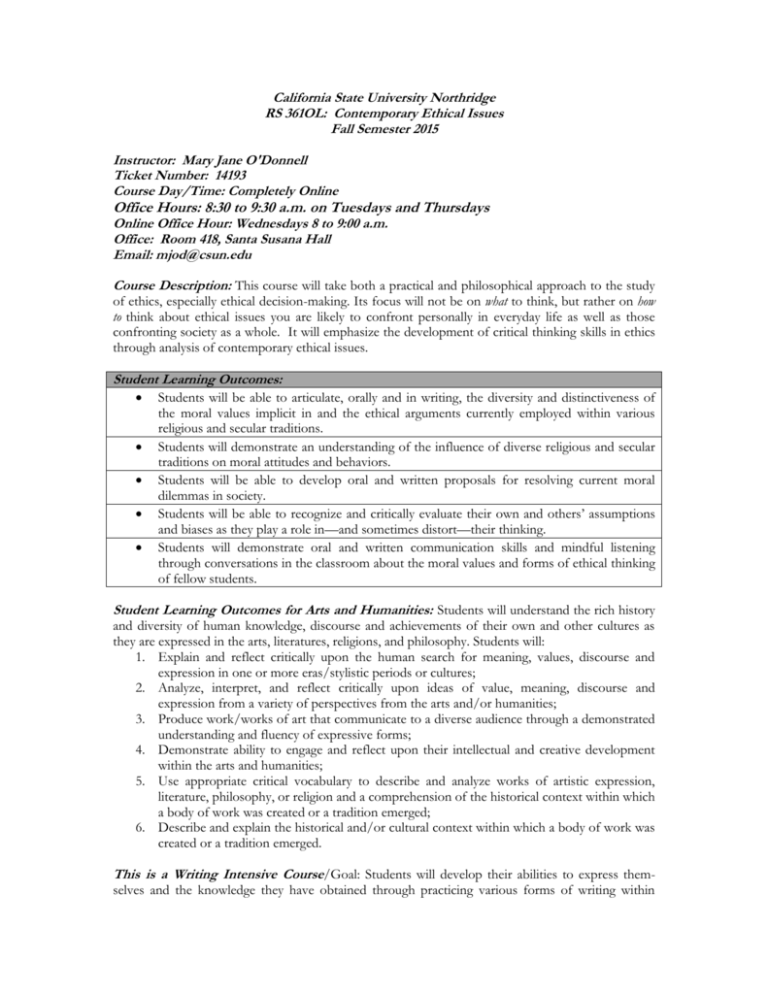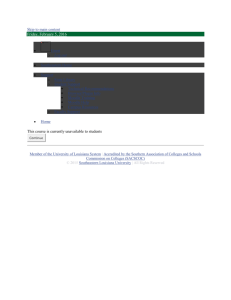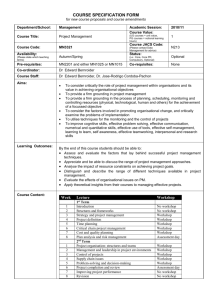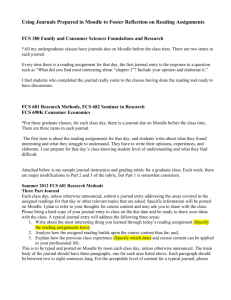
California State University Northridge
RS 361OL: Contemporary Ethical Issues
Fall Semester 2015
Instructor: Mary Jane O'Donnell
Ticket Number: 14193
Course Day/Time: Completely Online
Office Hours: 8:30 to 9:30 a.m. on Tuesdays and Thursdays
Online Office Hour: Wednesdays 8 to 9:00 a.m.
Office: Room 418, Santa Susana Hall
Email: mjod@csun.edu
Course Description: This course will take both a practical and philosophical approach to the study
of ethics, especially ethical decision-making. Its focus will not be on what to think, but rather on how
to think about ethical issues you are likely to confront personally in everyday life as well as those
confronting society as a whole. It will emphasize the development of critical thinking skills in ethics
through analysis of contemporary ethical issues.
Student Learning Outcomes:
Students will be able to articulate, orally and in writing, the diversity and distinctiveness of
the moral values implicit in and the ethical arguments currently employed within various
religious and secular traditions.
Students will demonstrate an understanding of the influence of diverse religious and secular
traditions on moral attitudes and behaviors.
Students will be able to develop oral and written proposals for resolving current moral
dilemmas in society.
Students will be able to recognize and critically evaluate their own and others’ assumptions
and biases as they play a role in—and sometimes distort—their thinking.
Students will demonstrate oral and written communication skills and mindful listening
through conversations in the classroom about the moral values and forms of ethical thinking
of fellow students.
Student Learning Outcomes for Arts and Humanities: Students will understand the rich history
and diversity of human knowledge, discourse and achievements of their own and other cultures as
they are expressed in the arts, literatures, religions, and philosophy. Students will:
1. Explain and reflect critically upon the human search for meaning, values, discourse and
expression in one or more eras/stylistic periods or cultures;
2. Analyze, interpret, and reflect critically upon ideas of value, meaning, discourse and
expression from a variety of perspectives from the arts and/or humanities;
3. Produce work/works of art that communicate to a diverse audience through a demonstrated
understanding and fluency of expressive forms;
4. Demonstrate ability to engage and reflect upon their intellectual and creative development
within the arts and humanities;
5. Use appropriate critical vocabulary to describe and analyze works of artistic expression,
literature, philosophy, or religion and a comprehension of the historical context within which
a body of work was created or a tradition emerged;
6. Describe and explain the historical and/or cultural context within which a body of work was
created or a tradition emerged.
This is a Writing Intensive Course/Goal: Students will develop their abilities to express themselves and the knowledge they have obtained through practicing various forms of writing within
different disciplinary contexts. Writing intensive courses will build upon the skills gained in the
Analytical Reading and Expository Writing section of Basic Skills. In each WI course students will be
required to complete writing assignments totaling a minimum of 2500 words.
Student Learning Outcomes/Students will: 1.) Develop and clearly define their ideas through writing; 2.)
Ethically integrate sources of various kinds into their writing; 3.) Compose texts through drafting,
revising, and completing a finished product; 4.) Express themselves through their writing by posing
questions, making original claims, and coherently structuring complex ideas; 5.) Revise their writing
for greater cogency and clarity; 6.) Utilize adopted communication modes and documentation styles
of specific disciplines (MLA, APA, Chicago, CBE, etc.) where appropriate.
Required Texts:
A Practical Companion to Ethics (4th ed.) by Anthony Weston, Oxford University Press, 2011
Defining Moments: When Managers Must Choose Between Right and Right by Joseph L. Badaracco,
Jr., Harvard Business School Press, 1997
Justice: What’s the Right Thing to Do? by Michael J. Sandel, Farrar, Straus and Giroux, 2010
Religious Foundations for Global Ethics by Robert McLaren, Pearson/Prentice Hall, 2008
Instructor Consultation: My “office hours” are both virtual and in my office at the times listed
above. I look forward to working with each of you. I am happy to discuss any aspect of this course
with you, and help you with the assignments. I especially urge you to contact me if you are confused
about the course or an assignment. Really successful students ask questions!
Technological Information: This course will employ the Moodle web-based format for posting
assigntments. YOU WILL BE RESPONSIBLE FOR KNOWING HOW TO USE THIS
FORMAT! For instruction on how to use this technology, go to http://www.csun.edu/it/studentmoodle-help/
Many of the issues discussed under the heading of “ethics” (corporate malfeasance, cloning,
abortion, the death penalty, cyberethics, privacy, affirmative action, medical ethics, end of life issues,
and such) are frequently discussed in the media, political campaigns, religious settings, and even at
home. You probably already have opinions about each.
However, many of the discussions
surrounding these issues are often heated and, quite frankly, emotional and uninformed. I want to
make clear that this course will not be an ethical bull session. I, of course, want you to develop your
opinions, but I want them to be truly informed opinions, not gut emotional responses.
The process one uses to make ethical decisions is itself an ethical matter. Ethical decisions must be
informed decisions. This requires research and gathering a range of information and opinions about
an ethical issue, not just those with which you agree. Only after objective analysis of the facts of the
issue and all points of view can you make a truly “moral” ethical decision.
Course Assignments:
Weekly Reading: All reading assignments must be carefully read and fully incorporated into
your discussions and assignments. Although you will have the week to complete the written
assignments, I expect the reading to be done as early in the week as possible. This will allow
you to participate fully in the class discussions.
Weekly Discussions: Students MUST participate in weekly discussions regarding the
readings assigned for the week. You must make three (3) separate substantive contributions
each week. Each individual posting must be approximarely 250 words in length, which taken
together will be 750 words per week. (See “discussions rubric” for more informaiton.) You
will comment in detail and with serious thought to concepts presented in the course material
and comments made by classmates on the discussion site. You must cite specific ideas,
issues, or events in the texts that you think need to be discussed in order to fully understand
the week’s topic. You should refer to specific points made by the authors. Students may raise
questions as well, which should be answered by others. The more engaged and thorough you
are in the discussions, the better your grade will be. Each posting should be thoughtful and
well written. Do not use generalities. Do not simply summarize the material, rather you must
analyze the material. This will comprise 50% of your grade for the course.
Reflection Papers: Students will write two 4-page reflection papers related to the
exploration of an ethical issue. Papers should include three distinct parts: 1.) a statement
and background description of the ethical question you wish to address; 2.) an impartial and
thorough description of the various arguments being made about the question, which must
be specifically cited in your papers; and 3) your own conclusion or opinion about the matter
and an analysis of how you have arrived at your answer. This will comprise 50% of your
grade (25% each).
Films and Videos: In addition to the readings, you will be asked to watch a variety of films
or videos online that address issues related to the readings. Incorporate your thoughts
regarding these films in your discussions and, if appropriate, assignments.
News Items: Given the times we are living in, many ethical outrages are in the news on a
daily basis. I think it will be quite interesting to include these news items in our discussions.
In fact, I want you to look for items in the paper that are relevant to our reading for the
week. I will also point out news articles, especially analysis, in such publications as the New
York Times, Los Angeles Times, Washington Post, Financial Times, and The Economist—among
many others. All of these publications are online and a vital source of daily news, research,
and discussion.
Course Requirements:
With the exception of the last week of the course, a “week” in this class will begin on
Monday mornings at 6:00 a.m. and end on Sundays at 11:00 p.m., which will be when all
assignments for the week are due. If, for example, you fail to post on the discussions site on
the week assigned, you will not be able to do so at a later date.
All papers must be written according to basic scholarly standards appropriate for university
level work. Not only does this include proper grammar, punctuation, and syntax, but also
serious reflection on your topic. There are many sources to help you with your writing
assignments. The most important is the Writing Program at CSUN’s Learning Resource
Center, Oviatt Library, 3rd Floor, East Wing, 818-677-2033 or go to:
http://www.csun.edu/undergraduate-studies/learning-resource-center
All assignments must be turned in or posted on Moodle on the date listed. Unless students
present a written and documented reason why an assignment is late or will be late, which is
accepted by the instructor, the grade will be deducted one letter grade per day.
Any evidence of plagiarism will result in a failing grade, certainly for the item plagiarized, but
also for the course.
Grading: Plus-Minus System will be used
Weekly commentaries: 50%
Two reflection papers: 50% (25% each)
Letter Grades:
95-100 A
90-94 A87-89 B+
83-86
80-82
77-79
B
BC+
73-76
70-72
60-69
C
CD
Course Schedule:
Week 1: August 24-30
Post personal introductions: Tells us who you are, your major, year, and anticipated
occupation. Tell us what ethical issues you think are important to discuss and the reasons
why you think they are important;
Read: Weston, “Getting Started,” “Beyond Authority,” and “Ethical Theories,” pages vii to
63.
Watch: Gerd Leonhard, “Digital Ethics and the Future of Humans in a Connected World”
on Moodle.
Post on Moodle: Three separate substantive commentaries. Review “discussions rubric”
before submitting.
Week 2: August 31-September 6
Read: Weston, “When Values Clash,” “Creative Problem-Solving in Ethics,” and “Making a
Difference,” pages 64-128
Watch: Sam Harris, “Science Can Answer Moral Questions” on Moodle.
Post on Moodle: Three separate substantive commentaries. Review “discussions rubric”
before submitting.
Week 3: September 7-13
Read: McLaren, “The Moral Proclivity,” 1-32
Watch: Dan Ariely on “Our Buggy Moral Code” on Moodle.
Post on Moodle: Three separate substantive commentaries. Review “discussions rubric”
before submitting.
Week 4: September 14-20
Read: McLaren, “The Moral Person,” 33-67
Watch: Damon Horowitz, “We Need a ‘Moral Operating System’” on Moodle.
Post on Moodle: Three separate substantive commentaries. Review “discussions rubric”
before submitting.
Week 5: September 21-27
Read: McLaren, “Value Conflicts in a Pluralistic Society,” 193-241
Watch: Jonathan Haidt on “The Moral Roots of Liberals and Conservatives” on Moodle
Post on Moodle: Three separate substantive commentaries. Review “discussions rubric”
before submitting.
Week 6: September 28-October 4
Read: McLaren, “Religion, Morality, and the Culture of Violence,” 242-279
Watch: “The Stanford Prison Experiment” on Moodle
Post on Moodle: Three separate substantive commentaries. Review “discussions rubric”
before submitting.
Week 7: October 5-11
Read: Badarraco, “Dirty Hands,” “Right versus Right,” “the Futility of Grand Principles,”
and “Sleep-Test Ethics,” page ix-66
Post on Moodle: Three separate substantive commentaries. Review “discussions rubric”
before submitting.
Week 8: October 12-18
Read: Badarraco, “Become Who You Are,” “Truth is a Process,” “Virtu, Virtue, and
Success,” and “A Space of Quiet,” 54-131
Watch: Mark Bertolini, “The Power of Mindfulness in the Workplace” on Moodle.
Post on Moodle: Three separate substantive commentaries. Review “discussions rubric”
before submitting.
Week 9: October 19-25
Complete First Reflection Paper; Due: October 25 at 11 p.m.
Week 10: October 26-November 1
Read: Sandel, “Doing the Right Thing,” pages 3 to 30.
Watch: Gordon Brown, “Global Ethic vs. National Interest” on Moodle.
Post on Moodle: Three separate substantive commentaries. Review “discussions rubric”
before submitting.
Week 11: November 2-8
Read: Sandel, “Utilitarianism” and “Libertarianism,” p.31-74
Watch: Tariq Ramadan on “Religion, Spirituality and Ethics” on Moodle.
Post on Moodle: Three separate substantive commentaries. Review “discussions rubric”
before submitting.
Week 12: November 9-15
Read: Sandel, “Markets and Morals,” and “Immanual Kant,” 75-139
Watch: Jeffrey Howard, “Let’s Disagree Morally” on Moodle.
Post on Moodle: Three separate substantive commentaries. Review “discussions rubric”
before submitting.
Week 13: November 16-22
Read: Sandel, “John Rawls,” “Affirmative Action,” pages 140-183
Watch: Gary Gray on “Trust in Research: the Ethics of Knowledge Production” on
Moodle.
Post on Moodle: Three separate substantive commentaries. Review “discussions rubric”
before submitting.
Week 14: November 23-29
Work on Second Reflection Paper, which is due on December 8 at 11 p.m.
Happy Thanksgiving
Week 15: November 30-December 6
Read: Sandel, “Who Deserves What?,” What Do We Owe One Another,”, “Justice and the
Common Good,” 184-269
Watch: Kwame Anthony Appiah, “Honor and Moral Revolutions” on Moodle.
Post on Moodle: Three separate substantive commentaries. Review “discussions rubric”
before submitting
Week 16: December 8
Second Reflection Paper Due December 8 to be posted on Moodle by 11 p.m.
Possible sources for issues involving ethics:
BBC Religion and Ethics: http://www.bbc.co.uk/religion/0/
Religion and Ethics Newsweekly: http://www.pbs.org/wnet/religionandethics/
Business Ethics Blog: http://businessethicsblog.com
Practical Ethics/Ethics in the News: http://blog.practicalethics.ox.ac.uk
Ethics Alarms: http://ethicsalarms.com
Practical Ethics: Ethics in the News: http://blog.practicalethics.ox.ac.uk
The Ethicists: http://www.nytimes.com/column/the-ethicist?qa&scp=1spot&sq=&st=nyt
Other Possible Websites to use for weekly discussions:
*Los Angeles Times: http://www.latimes.com/
*New York Times: http://www.nytimes.com/
*Washington Post: http://www.washingtonpost.com/
Huffington Post: http://www.huffingtonpost.com/news/ethics/
*Newsweek: http://www.newsweek.com/
*Time: http://www.time.com/time/
*These websites now allow only limited access without a subscription. For example, you may read 10 articles a month
on the LA Times’ site, 20 on the Washington Post’s, and 10 on the NY Times’. However, there is good news for
students. The Washington Post has a free student subscription. I urge you to sign up. It has a very good “Religion”
section. One way to make up for the other above publications is to use LexisNexis Academic on the Oviatt Library’s
Website. This database allows you access to the most recent articles from major world publications, including
newspapers, magazines, wire services, broadcast transcripts, and blogs. It also allows you to filter articles according to
subject.
Important to note: This syllabus is subject to change. I will make every effort to notify you in
advance about any changes.
DRES: If you have a disability and need accommodations, please register with the Disability
Resources and Educational Services (DRES) office or the National Center on Deafness (NCOD).
The DRES office is located in Bayramian Hall, room 110 and can be reached at 818-677-2684.
NCOD is located on Bertrand Street in Jeanne Chisholm Hall and can be reached at 818-677-2611.
If you would like to discuss your need for accommodations with me, please contact me to set up an
appointment.









